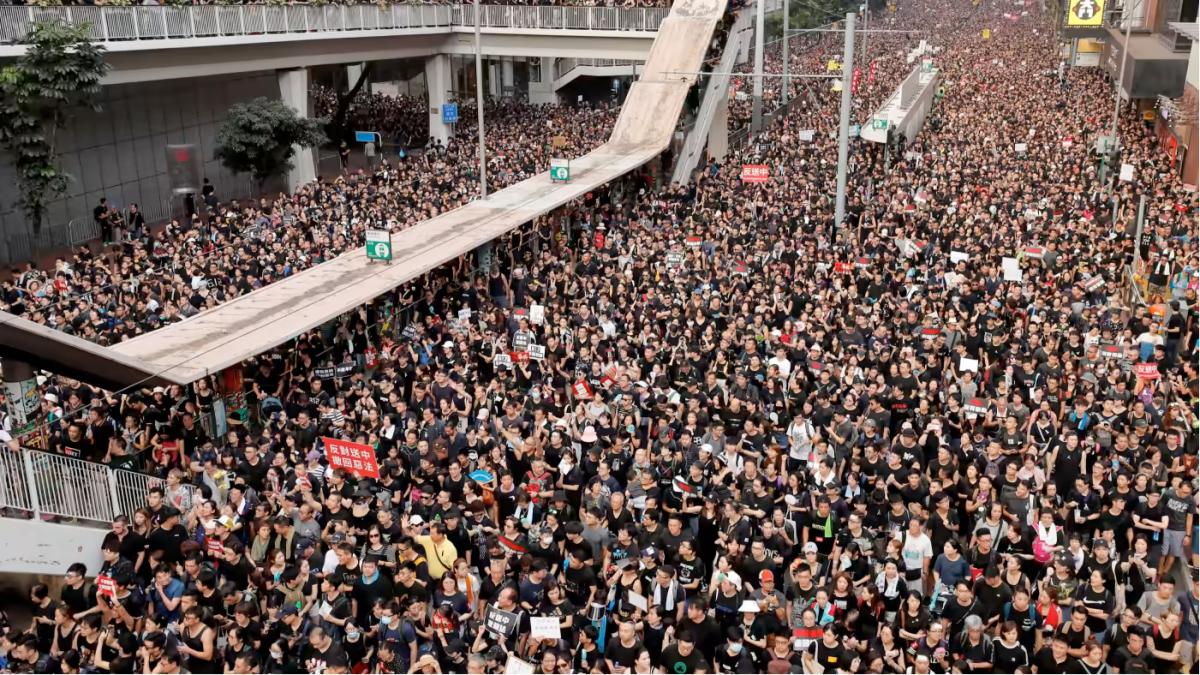 Beijing imposed a sweeping security bill on Hong Kong after the city was rocked by anti-government protests in 2019. © Reuters
Beijing imposed a sweeping security bill on Hong Kong after the city was rocked by anti-government protests in 2019. © Reuters
Originally By PAK YIU For NIKKEI Asia (English only)
Published: 7 JUL 2022
Financial hub has taken a sharp authoritarian turn since last evaluation
HONG KONG -- The United Nations on Thursday starts its first review of human rights in Hong Kong since Beijing imposed a sweeping security law that critics say has crushed civil liberties in the city.
The U.N.'s Human Rights Committee is tasked with evaluating how well the financial hub is following its commitments under the International Covenant on Civil and Political Rights (ICCPR). City officials are required to respond to questions from a panel of rights experts every four years as part of that obligation.
But Hong Kong's political scene has taken a sharp authoritarian turn since the security bill was enacted in mid-2020, after the city was rocked by mass street protests the previous year.
The crackdown led to the jailing of dozens of activists and the closure of nearly 60 civil society groups as some of their leaders were jailed. The city's election laws have been overhauled to block pro-democracy hopefuls from sitting in its legislature. There are also concerns about the wide-ranging security law undermining Hong Kong's judiciary.
"This is the opportunity for the international community and Hong Kong civil society to raise these issues in front of an independent panel of human rights experts," Sharon Tam, executive director of Human Rights in China, told Nikkei Asia. "The committee should raise tough, detailed substantive questions, following up and pushing the government.
"We want [the] committee to adopt clear recommendations on legislative reform and policy reform, on specific cases," she added.
The U.N.'s review will be a key test of whether a new government under former security chief John Lee still sees the international treaty as relevant to its policies and governance.
Hong Kong authorities said Thursday that a delegation would take part in the review by videoconference. In the past, more than a dozen government officials were sent to Geneva to take part in the process.
Last week, Chinese President Xi Jinping said Hong Kong's semi-autonomous status would be respected but warned that the city could not fall back into what he described as "chaos."
The review comes after U.N. human rights chief Michelle Bachelet was heavily criticized for accepting a tightly monitored trip to China's Xinjiang region last month over claims of rights abuses against Uyghurs and other ethnic minorities.
Notably absent from the latest Hong Kong review will be input from local civil society groups, which had previously submitted the bulk of reports for the U.N. panel's review.
This time around, reports all came from overseas groups, except for one supplied by the Hong Kong and Mainland Legal Profession Association, which defended the security law.
Hong Kong's Legislative Council previously held public hearings and invited nongovernmental organizations to voice their concerns ahead of the meeting. Rights activists say the government "took the review process seriously" and engaged in open dialogue about issues of concern.
During the last U.N. review, in 2018, some 45 local civil society groups warned that Hong Kong's international reputation was at risk and called on officials to uphold rights and freedoms guaranteed under its miniconstitution, known as the Basic Law.
In 2021, four United Nations rights experts urged Hong Kong to launch an independent review of the national security law, saying it was incompatible with international rights and civil liberty standards.
"There is no improvement at all since the last review. On the contrary, there is a large step backward in the compliance of international human rights mechanisms," said Chakra Ip, executive director of The 29 Principles, an NGO focused on the city's legal sector.
Many of the submissions by organizations touch on the erosion of freedom of expression and the press, the pressure on judicial independence and the overhaul of the political system.
"If the Hong Kong government hopes to salvage its international reputation, then it should view the July 2022 review as an opportunity to develop a more restrained approach to enforcement," Carole J. Peterson, a University of Hawaii law professor focused on Hong Kong's constitutional law, wrote in a blog post last month.
